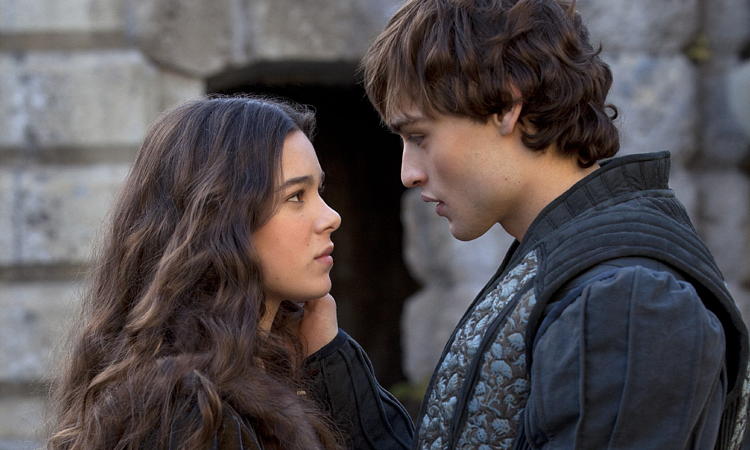By Meredith Alloway · October 17, 2013

It’s a story of star-crossed lovers that we all know. As Downton Abbey creator Julian Fellowes puts it, “there are certain stories that won’t die.” Fellowes adapts the classic Shakespearean play into his own version of Romeo and Juliet. Hailee Steinfeld (True Grit) and Douglas Booth (Great Expectations) star as the couple with Carlo Carlei (The Last Legion) directing.
In Los Angeles, they discussed the need to revisit the tale and preparing for such a great feat. Carlo stresses it was the script that first convinced him. “I was mesmerized. This was like an action movie and you were absolutely blown away by only the dialogue. I suggested one thing, to set in the renaissance. “
Steinfeld is very close in age to the character of Juliet. She’s asked how being a teen herself aided her performance. “I think what I love so much about Juliet is how youthful she is and how innocent she is. I definitely saw a side of vulnerability and innocence that I had never really done before. She’s very strong and independent. She doesn’t really know what she wants until she doesn’t have it, that’s like most of us in some situations. You really see her fight for what she loves. Fellowes adds, “Although it feels very modern, it’s all in the play. It proves we didn’t invent being a teenager. It’s a condition of the mind that’s as old as we are.”
Steinfeld approached Juliet similarly to her Oscar nominated role for True Grit. “I think with True Grit, the language is very specific as with Shakespeare. You couldn’t really improvise and nor did you ever really half to. It was written so beautifully. With Shakespeare it was definitely a process learning that text, going through and translating each thing. They were both equally difficult.”
Someone is surprised at how they viewed Romeo as such a sociopath in the story. Booth laughs, “He lives in the moment. He falls very quickly. In the end when he’s with Paris he says, ‘Please don’t make me kill you.’ Because he’s going to do anything he needs to do to be with his Juliet. Nothing will stop him.” Booth is asked about how he prepares to play Romeo. “You approach each character in the same way. First I have to go inside myself and establish something real. Then I think how do I twist this. It’s all part of me.”
The big question for everyone was why another R&J. Shakespeare adaptations are done constantly and they’re also incredibly hard to get right. People are mixed on Baz Luhrmann’s vivid adaption from 1996. Fellowes explains, “I think it’s always a challenge to adapt something from one medium to another. In Shakespeare’s day, the play would run for three and half hours and during that time you wandered around, you got your food, you were silent for some of the good bits. We don’t have that now, we sit in the dark; we concentrate. We need our stories to be told in a shorter period. We were very keen to appeal to an audience beyond that of Shakespeare’s scholars. We didn’t want to present a story that you needed to be a student of Shakespeare to understand it.”
This is something that makes his translation unique. Unlike Luhrmann’s adaptation, Fellowes does attempt to preserve the majority of the text, but also making it comprehensible to the viewer. No one wants to need a Shakespeare lexicon on hand in the theater. He continues, “The great advantage of a movie… is that you can stay with the visual narrative; you’re following [Shakespeare’s] definition…because he chooses his locations like a moviemaker. For him, you stick one tree on the back of the stage and you’re in the park. That was an advantage that Carlo took with both hands and opened it up staying with Shakespeare’s choice of location, but making them real.”
Fellowes is asked about his attraction to tragic love. He also explores it in Downton Abbey. “This whole business of love ending in death, I grew up on it. You remember those songs ‘Tell Laura I love her.’ He commences to sing a few lyrics, which makes everyone giggle. “That was really my sort of adolescent culture. I got there before Twilight. There is something about the ultimate sacrifice to preserve you’re love… that we all find very appealing. Perhaps because it’s a sort of an ideal that most of us don’t live up to. Most of didn’t marry our first love, but we all went through it. These stories, and Romeo more than any other, take us back into that emotion. I suppose I respond to that as much as anyone else does. Odd as it may seem, looking at this porky old fellow…once inside there was a lover!” Everyone claps. Fellowes is quite the performer.
The cast admits that taking on the iconic roles were daunting. “You’re sort of terrified, but you’re excited. This was something I hadn’t really done before,” says Booth. Seinfeld adds, “ It comes down to loving the project and being passionate about it. I remember our table read; we were in Italy. Before we started Julian said to us that ‘this generation deserves their own Romeo and Juliet.’ I think everyone deserves to discover and rediscover this story.”